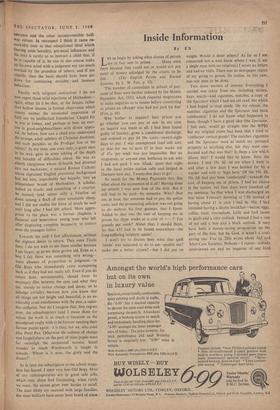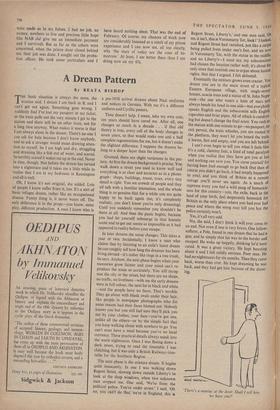Inside Information
By EX LET Ss begin by asking what classes of person are in fact sent to prison. . Many were there because they could not or would not pay sums of money adjudged by the courts to be due . . .' (The English Prison and Borstal Systems, by L. W. Fox. p. 15).
The number of cominittals in default of pay- ment of fines were further reduced by the Money Payments Act, 1935, which required magistrates to make inquiries as to means before committing to prison an offender who had not paid his fine' (Fox, p. 66).
Why bother to inquire? Into prison you go whether you can pay or not. In my case no inquiry was made at all. I had been found guilty of larceny, given a conditional discharge, and ordered to pay £4 19s. costs—twenty-eight days to pay. I was unemployed (and still am), so that for me to save £5 in four weeks out of 47s. per week was just impossible. But no magistrate, or anyone else, bothered to ask why 1 had not paid. 1 was 'lifted,' spent that night in the local police station cells and lodged in Durham next day. Twenty-five days to go!
So much for the Money Payments Act. But what about the economics of it all? Having done my stretch 1 was now free of the debt. But it still had to be paid—by someone. Who? Not me, at least, but someone had to pay the police costs, and the prosecuting solicitor was not going to do without his four guineas, that I know. Added to that was the cost of keeping me in
prison for the weeks at a cost of ? Ten pounds per week? About that, I should think. So that £35 had to be found somewhere—the long-suffering taxpayer again !
I won't try to discuss here what that spell 'inside' was supposed to do to me--punish me? make me a better citizen?—but I did put on
weight. Would it deter others? As far as I am concerned not a soul knew where I was: (I am a single man with no relatives.) I wrote no letters and had no visits. There was no newspaper report of my going to prison. So justice. in this case, was not seen to be done.
Two more matters of interest. Everything I carried was taken from me, including money, keys, watch—and cigarettes, matches, a copy of the Spectator which 1 had not yet read, but which 1 had hoped to read inside. On my release, the matches, cigarettes and the Spectator had been 'confiscated.' 1 do not know what happened to them, though I have a good idea (the Spectator, I feel sure, would go straight into the WPB). But my original crime had been that 1 tried to 'confiscate' certain goods! The matches, cigarettes and the Spectator were as much my personal property as anything else, but they were con- fiscated and that was that! Is there a law which allows this? I would like to know. Next the money. I had I9s. 4d. on me when 1 went in and after a few days I was bawled for by a warder and told to 'Sign here.' Of the I9s. 4d., 16s. 6d. had also been 'confiscated'—towards the cost of keeping me iri prison. I had no choice in the matter, but four days were knocked off my sentence. So that when I was discharged on that bitter February morning at 7.30, instead of having about LI in cash I had 4s. 10d. I had intended having a decent breakfast—bacon, eggs, coffee, toast, marmalade, knife and fork (none in gaol) and a rosy outlook. Instead 1 had a cup of tea and a bun and a black outlook. It may have been a money-saving proposition on the part of the law, but by God, it wasn't a soul- saving one. Fox (p. 263) writes about Aid and After-Care Societies. Nobody—I repeat--nobody interviewed me and no inquiries of any kind were made as to my future. I had no job, no money, nowhere to live and precious little hope (the NAB did give me an immediate payment and I survived). But as far as the others were concerned, when the prison door closed behind me, their job was done. I sought out the proba- tion officer. He took some particulars and I have heard nothing since. That was the end of February. Of course, my chances of work now are considerably lessened as a result of my prison experience and I can now see, all too clearly, why 'the stars of today are the cons of to- morrow.' At least, I ate better there than I am doing now on my 47s.



































 Previous page
Previous page